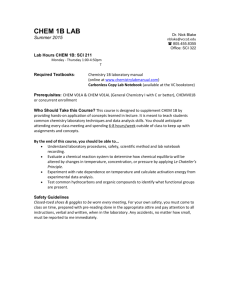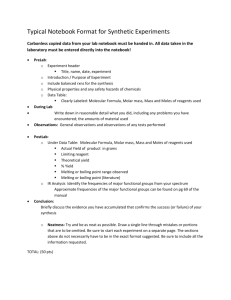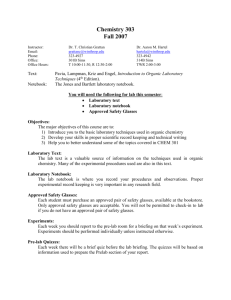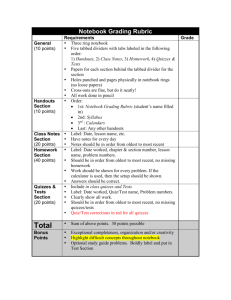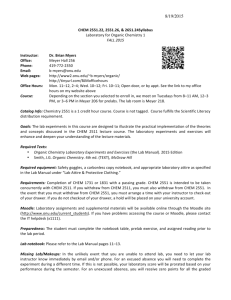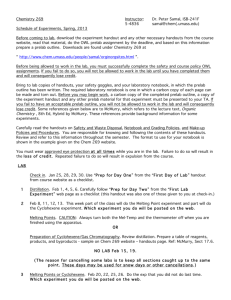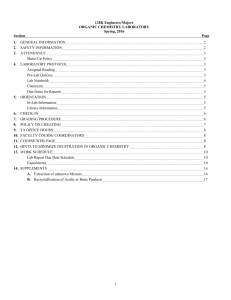University of Massachusetts at Amherst Department of Chemistry
advertisement
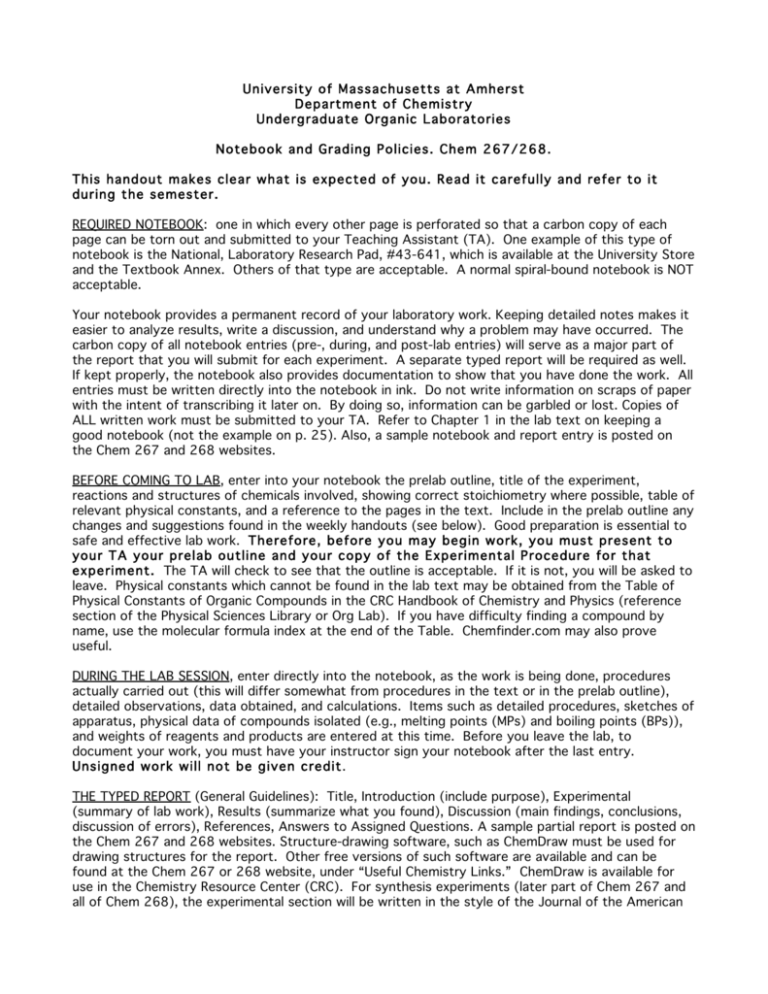
University of Massachusetts at Amherst Department of Chemistry Undergraduate Organic Laboratories Notebook and Grading Policies. Chem 267/268. This handout makes clear what is expected of you. Read it carefully and refer to it during the semester. REQUIRED NOTEBOOK: one in which every other page is perforated so that a carbon copy of each page can be torn out and submitted to your Teaching Assistant (TA). One example of this type of notebook is the National, Laboratory Research Pad, #43-641, which is available at the University Store and the Textbook Annex. Others of that type are acceptable. A normal spiral-bound notebook is NOT acceptable. Your notebook provides a permanent record of your laboratory work. Keeping detailed notes makes it easier to analyze results, write a discussion, and understand why a problem may have occurred. The carbon copy of all notebook entries (pre-, during, and post-lab entries) will serve as a major part of the report that you will submit for each experiment. A separate typed report will be required as well. If kept properly, the notebook also provides documentation to show that you have done the work. All entries must be written directly into the notebook in ink. Do not write information on scraps of paper with the intent of transcribing it later on. By doing so, information can be garbled or lost. Copies of ALL written work must be submitted to your TA. Refer to Chapter 1 in the lab text on keeping a good notebook (not the example on p. 25). Also, a sample notebook and report entry is posted on the Chem 267 and 268 websites. BEFORE COMING TO LAB, enter into your notebook the prelab outline, title of the experiment, reactions and structures of chemicals involved, showing correct stoichiometry where possible, table of relevant physical constants, and a reference to the pages in the text. Include in the prelab outline any changes and suggestions found in the weekly handouts (see below). Good preparation is essential to safe and effective lab work. Therefore, before you may begin work, you must present to your TA your prelab outline and your copy of the Experimental Procedure for that experiment. The TA will check to see that the outline is acceptable. If it is not, you will be asked to leave. Physical constants which cannot be found in the lab text may be obtained from the Table of Physical Constants of Organic Compounds in the CRC Handbook of Chemistry and Physics (reference section of the Physical Sciences Library or Org Lab). If you have difficulty finding a compound by name, use the molecular formula index at the end of the Table. Chemfinder.com may also prove useful. DURING THE LAB SESSION, enter directly into the notebook, as the work is being done, procedures actually carried out (this will differ somewhat from procedures in the text or in the prelab outline), detailed observations, data obtained, and calculations. Items such as detailed procedures, sketches of apparatus, physical data of compounds isolated (e.g., melting points (MPs) and boiling points (BPs)), and weights of reagents and products are entered at this time. Before you leave the lab, to document your work, you must have your instructor sign your notebook after the last entry. Unsigned work will not be given credit. THE TYPED REPORT (General Guidelines): Title, Introduction (include purpose), Experimental (summary of lab work), Results (summarize what you found), Discussion (main findings, conclusions, discussion of errors), References, Answers to Assigned Questions. A sample partial report is posted on the Chem 267 and 268 websites. Structure-drawing software, such as ChemDraw must be used for drawing structures for the report. Other free versions of such software are available and can be found at the Chem 267 or 268 website, under “Useful Chemistry Links.” ChemDraw is available for use in the Chemistry Resource Center (CRC). For synthesis experiments (later part of Chem 267 and all of Chem 268), the experimental section will be written in the style of the Journal of the American Chemical Society or the Journal of Organic Chemistry. You can access these journals at http://pubs.acs.org from any computer that has a UMass Amherst IP address. BY THE DUE DATE, the following will be submitted to your TA: all carbon copies of your notebook entries and the typed report. The complete write-up must be submitted to your instructor by the deadline (see Schedule Summary handout). Late submissions will result in the loss of 1 point per day, unless you have a valid reason and special arrangements have been made with your TA. LAB REPORT GRADING SCHEME: 2.0 2.0 2.0 4.0 10 points prelab outline notebook lab technique (subjective evaluation by TA) typed report including answers to assigned questions points total for each week's work Quizzes. During the semester, unannounced quizzes (5 pts each) will be given at the beginning of three of your lab periods. Make-up quizzes will not be given. Instead, the lowest quiz grade will be dropped. The total of the two best quizzes will have the credit equal to one exp and will be averaged into the final lab grade. OWL Assignments. Prelab. To help you prepare for each experiment, an assignment using OWL (Online Web-based Learning) will be done for credit. The deadline for completing the assignment is given in the Schedule Summary handout. It is highly recommended that you complete the assignment before preparing your prelab outline, as this will help you to get an overall idea of the material. Extensions will be granted only for reasons of extreme personal hardship and will require acceptable documentation. Postlab. OWL postlab assignments will be available for many experiments. Pay close attention to deadlines. ADVICE: in case of computer or other last minute problems do not wait until the last hour to do the OWL assignments. Final letter grades. It should be expected that different TA's will grade somewhat differently, with each having a slightly different average. To compensate for any disparity, each TA’s section will receive approximately the same grade distribution. Final grade = 15% OWL + 85% TA/quizzes. (Because at present there are only a few OWL assignments for Chem 268 the OWL % may be considerably less depending upon the number of OWL assignments. It will be roughly 1-2 % per assignment.) Weekly Handouts: For some experiments, especially those early on, the experimental procedure to follow is given in the weekly handout. In those cases the lab text will provide more general information needed to carry out the experiment. Later on, the handouts may simply contain changes in procedure and suggestions for each experiment. In all cases, the procedure will be developed by you, based on the handout and the procedure given in the lab text. A copy of weekly handouts for Chem 267/268 may be downloaded at "http://www.chem.umass.edu" - under “Current Students – Course Web Pages. Notes on the prelab outline: Before coming to lab, you must read the assigned material carefully, including the weekly handouts, and prepare an outline of the procedure that you will follow in the lab. This should be written in your own words, in outline form, and in enough detail so that you could do the experiment by following the outline only. You may occasionally be required to do this. The outline must also include a summary of safety precautions and waste disposal procedures for chemicals used in that experiment. If the TA deems that the outline is poorly prepared, you will lose credit (1 point) and will be required to leave the lab until you can return with an acceptable outline. In such cases, you would probably not have enough time to complete the experiment, and so would lose additional points. A poorly prepared lab worker is a danger to everyone in the lab and will therefore not be allowed to carry out lab work. Deadlines: After an experiment is finished, all completed material must be submitted to your TA by the deadline. Late submissions result in the loss of 1 point per day. Occasionally a sample needs time to dry. In such a case its weight and MP may be taken during scheduled morning hours in the Org Lab before the deadline, or if your schedule does not permit this, the weight and MP may be taken during the next lab period. If circumstances arise that require you to miss a lab period or that make it difficult for you to submit a report on time, make arrangements with your TA beforehand if possible. In such a case, you should present your TA with a valid excuse. This situation should not occur more than once in a semester. Punctual attendance at prelab talks is essential. During the prelab talk you will learn about safety and waste disposal specific to the experiment being discussed, changes in procedures, and detailed instructions for that experiment. Quizzes will be given at the beginning of three of the lab periods. Morning Lab Hours. The Organic Lab will be open during scheduled morning hours on certain days of the week. The hours and days will be posted on the web and at the lab. During morning hours the only lab operations that may be done are the determination of melting points and weighings. This time may also be used to consult with the TA on duty. Make-ups may NOT be done during these hours. SUMMARY of what needs to be done before coming to lab: do the OWL assignments, do the readings (lab text, lecture text if applicable, weekly handout), write a prelab outline, attend the prelab lecture. Dr. Peter W. Samal, LGRT 304-B, ext 5-4836, samal@chem.umass.edu (revised 7/10)
